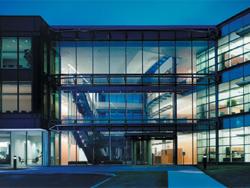Lockhart Discusses Impact of Armstrong Sale
In the interview, Armstrong chairman and CEO officer Michael D. Lockhart acknowledges that, depending on the buyer, some of Armstrong's 2,000 jobs here are more vulnerable than others.
But for the company overall, a change in ownership can be a change for the better, he says.
"It's hard to see the positive side of this when your job's at risk. It's hard for people to see that," said Lockhart.
"What we're trying to convince them of is that change always presents risk and opportunity, and as soon as I say we're going to be sold, the risk is the thing you see.
"Our job is to get them to envision the opportunity that'll come out of this — to create good value for the existing shareholders and have a stronger, better-positioned company going forward," said Lockhart.
Armstrong's disclosure that it has "initiated a review of its strategic alternatives" elevated its stock $4.93, or 10.6 percent, to close
Armstrong recently completed a nearly six-year bankruptcy to resolve a glut of asbestos personal-injury claims that were draining the firm of tens of millions of dollars a year.
About two-thirds of that new stock is held by a trust formed to pay all current and future asbestos claims against Armstrong.
In a wide-ranging interview, Lockhart candidly discussed why the company was being offered for sale now, as well as the impacts, process, price and other issues related to a sale.
"We'll have a process of finding out who's really serious. If, at the end of the day they have an attractive proposition, we'll sit down and negotiate a deal with them," said Lockhart.
But the CEO warned that Armstrong will not be able to discuss who it's talking with, or how those talks are going, "a situation that's going to frustrate people, I'm afraid."
Armstrong believes it will attract strong interest, Lockhart indicated, given that "a lot of people have been interested in Armstrong for a long time."
What price that interest ultimately produces remains to be seen. "What it's worth is what somebody will pay for it, and who the heck knows?" said Lockhart.
Although Armstrong's current stock price (about $51 a share) and its number of shares outstanding (54.1 million) suggest a price of about $2.8 billion, he noted that the current price is based on the sale of a fraction of the total shares.
"Now, would people buying all of it pay more or pay less? I don't know. What I do know is, there's not a CEO in
How long the process will take also is unknown, he said. Lockhart added that it's "certainly possible" that Armstrong will sell just one of its businesses, but it's "more likely" that the entire company will change hands.
What will that mean for the 14,200 Armstrong employees worldwide, including 2,000 in
"We would not expect to see substantial job loss in the businesses...," such as floors, ceilings and cabinets, no matter who buys Armstrong, said Lockhart.
"
As a result, said Lockhart, "If you're directly related to one of the businesses, you should feel comfortable but not certain" that your job will be safe.
On Armstrong's corporate side, though, the impact on the work force will depend on the kind of buyer.
Should Armstrong be bought by a private equity firm, which lacks the corporate staff to run a global manufacturer, there'd be "substantially less impact" than if it's bought by another manufacturer, which would already have a corporate structure in place.
"If you're involved in corporate, you should feel less comfortable, but not certain that something bad is going to happen," he said.
Lockhart did not foresee a buyer making big changes to employee pay and benefits, since the pay is typical for companies of Armstrong's size and type, and the benefits package was recently updated.
But Armstrong employee pensions, supported by Armstrong's overfunded pension plan, could end up being backed by fewer assets, he cautioned.
"An acquirer could take that plan and merge it with another one that was underfunded. In and of itself, that does not necessary mean people would be hurt or would lose their pension.
"It just means their layer of protection is thinned out a little bit," Lockhart said.
While a purchase by a rival manufacturer would lead to the absorption of Armstrong, a purchase by a private equity firm would leave Armstrong "no less independent than I am today," said Lockhart.
"We think it could be very beneficial for Armstrong," he said.
Related Topics:Armstrong Flooring
